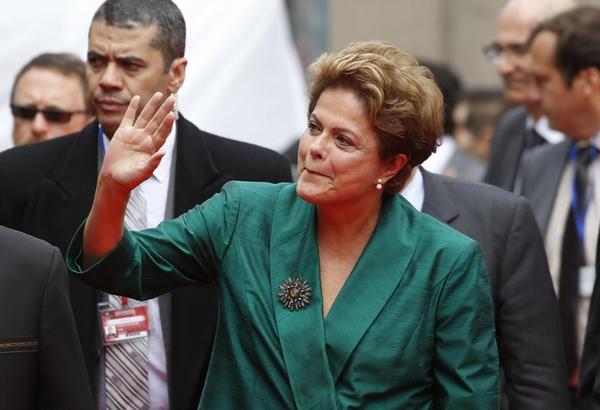(AP photo)
WASHINGTON - Fresh off a narrow victory in a contentious election, Brazilian President Dilma Rousseff has signaled an interest in restoring momentum in Brazil's ties with the United States as well as a renewed focus on the European Union. Brazil's growth is collapsing due to continuing infrastructure, regulatory, and fiscal problems, as well as tightening external credit and low global commodity prices. The cumulative impact of these factors is encouraging tighter fiscal and monetary policies at home, and a trade agenda that focuses on a Mercosur-EU free trade agreement with Brussels and trade facilitation and regulatory convergence with Washington.
These initiatives are being pursued in the context of negotiations over a Transatlantic Trade and Investment Partnership between the United States and EU, a mega-trade deal that Brazil worries will leave it outside global value chains. Given its similar fears regarding the Trans-Pacific Partnership, stagnant domestic economic growth, and a devalued currency, Brazil has turned its attention to exports - and to its northern Atlantic partners in particular.
Brazil-U.S. relations faltered amid Rousseff's reaction to revelations of U.S. National Security Agency data mining in Brazil and related issues. Rousseff postponed a planned October 2013 state visit to Washington and put on hold multiple policy dialogues with the United States. Recent announcements - including a rescheduled visit to Washington in September and the appointment of former Foreign Minister Luis Alberto Figueiredo as ambassador to the United States - suggest Brazil wants to rebuild bilateral bridges and put ties back on a more productive footing.
Last week's visit to Washington by Armando Monteiro, Brazil's minister of development, industry, and trade, was a positive signal for the commercial relationship. Monteiro used his first international trip to focus on a pragmatic agenda of trade facilitation and regulatory convergence with the United States. One measure that Monteiro proposed was to link U.S. and Brazilian online foreign trade portals, websites that centralize information on procedures for businesses seeking to import and export. Regulatory convergence in areas such as ceramics, tiles, machines and equipment, and textiles are among Brazil's other proposals. In the longer term, deeper cooperation with the United States on innovation and investment are priorities.
Brazil's near-term trade agenda with the United States is intended to deliver quick, tangible results. It also dovetails with the Trade Facilitation Agreement reached by the World Trade Organization (WTO) in Bali in 2013, which formally entered the WTO rulebook in November last year, and which was championed by the WTO's Director General Roberto Azevêdo, a Brazilian. Eliminating non-tariff barriers to trade via the Bali agreement is estimated to add up to $1 trillion to the global economy through more efficient customs procedures, reduced red tape, and improved border infrastructure, thereby speeding delivery of goods and improving access to markets.
In addition to closer ties with the United States, Brazil wants to strengthen commercial and political linkages with the European Union. The priority with Europe is to finalize a stalled trade pact between the EU and Mercosur (a bloc comprised of Argentina, Brazil, Paraguay, Uruguay, and Venezuela). One of the main difficulties in advancing an EU-Mercosur deal has been Argentina's isolationist position on international trade. Throughout 2014, Mercosur countries hotly debated ways to move forward together.
Last week, German Foreign Minister Frank-Walter Steinmeier met with Rousseff in Brasília to discuss bilateral ties, trade, and Merkel's state visit to Brazil in August this year. They signed a "working holiday" agreement that will allow Germans and Brazilians aged 18 to 30 to work and study for up to a year in the other country. Steinmeier also stressed Germany's interest in deepening trade ties with Brazil and reaffirmed Germany's commitment to accelerating the EU-Mercosur trade negotiations, while Brazilian Foreign Minister Mauro Vieira confirmed that Mercosur's proposal is ready and awaits the EU proposal.
Disagreements within Rousseff's Workers' Party (PT) about opening the Brazilian economy could always derail Brazil's Atlantic trade agenda. Moreover, a massive money-laundering scandal surrounding the state-run oil company Petrobras, which implicates many PT members, seems to be rapidly depleting Rousseff's political capital. As this impinges on her ability to manage her diverse coalition in Congress, it is unclear if she will be able to sustain legislative support for her second-term goals.
Nevertheless, Brazil has set a proactive Atlantic agenda centered on trade facilitation, regulatory convergence, and an EU-Mercosur trade pact. As Brazil continues to explore and define its role on the international stage, exercising the soft power of agenda-setting appears to be emerging as one of its primary tools. Brazil is, of course, seeking domestic gains from these moves. But in helping to frame and advance the trade agenda both globally and in the Atlantic, Brazil is stepping forward in a leadership role.

